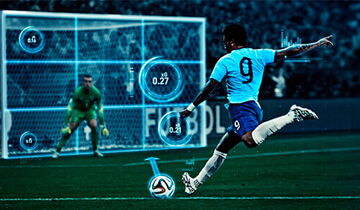Als voetbalfan heb je vast wel eens een gele kaart gezien tijdens een wedstrijd. Maar wat betekent het eigenlijk? Een gele kaart wordt aan een speler gegeven als waarschuwing, meestal voor het overtreden van een spelregel. Het is niet zo ernstig als een rode kaart, die leidt tot verwijdering uit het spel, maar het is nog steeds iets dat spelers willen vermijden. Dus wat zijn enkele redenen waarom een speler een gele kaart kan krijgen? Laten we eens kijken.
De waarschuwende aard van een gele kaart
Een gele kaart in voetbal wordt gegeven aan een speler die een overtreding begaat. Voetbal is een spannend spel dat vaardigheid, discipline en snelle beslissingen vereist. Een deel van de voetbalcultuur draait om het geven van gele kaarten voor overtredingen en overtredingen, wat een belangrijke waarschuwing is om spelers in het gareel te houden.
De beslissing om een gele kaart te tonen is aan de scheidsrechter en kan bepalen hoe de wedstrijd verloopt. Afhankelijk van hoe ernstig de overtreding is, kan het betekenen dat een speler met een rode kaart van het veld wordt gestuurd en het veld moet verlaten - of erger nog, als de gele kaart gedurende de hele wedstrijd wordt gegeven, kan het leiden tot schorsingen.
Gevolgen en tijd buiten het veld
De speler moet dan het speelveld voor een bepaalde tijd verlaten, afhankelijk van de ernst van de overtreding. Bij voetbal kan een speler van het speelveld worden gestuurd na het begaan van een ernstige overtreding. Dit betekent dat hij het veld moet verlaten en niet aan het spel mag deelnemen gedurende een periode die door de scheidsrechter wordt bepaald, afhankelijk van de ernst van zijn gedrag.
Dit kan variëren van het simpelweg verlaten van het veld tijdens een paar minuten spelen als de speler een gele kaart heeft gekregen tot het niet kunnen deelnemen aan een hele wedstrijd als de speler een rode kaart heeft gekregen. Uit het veld gezonden spelers mogen pas weer het voetbalveld op als deze periode is verstreken.
De dubbele gele kaart en uitwijzing
Als een speler twee gele kaarten krijgt in één wedstrijd, resulteert dit in een rode kaart en wordt de speler automatisch uit de wedstrijd gegooid. Deze regel is ingesteld om ervoor te zorgen dat spelers respect hebben voor hun tegenstanders, minder overtredingen maken en niet meedoen aan gevaarlijk spel.
Door een speler die twee gele kaarten heeft verzameld te laten weten dat hij uit het spel wordt genomen, worden ze verantwoordelijk gehouden en worden wedstrijden aangemoedigd om veilig en eerlijk te blijven. Bovendien, als een speler uit het veld wordt gestuurd vanwege deze regel, dient dit vaak als een waarschuwing voor voetbalteams die meer toegeeflijke scheidsrechters kan aanmoedigen om in de toekomst strenger te zijn.
Onsportief gedrag signaleren
Gele kaarten worden ook gebruikt om spelers te waarschuwen voor hun gedrag en ze te waarschuwen dat ze een rode kaart kunnen krijgen als ze zich niet verbeteren. Gele kaarten zijn van onschatbare waarde in het voetbal, omdat ze scheidsrechters in staat stellen spelers te laten weten dat ze zich gedragen op een manier die in strijd is met de regels. Zonder gele kaarten zou voetbal chaotisch zijn, omdat niemand in staat is om wangedrag op het voetbalveld te bestraffen of te controleren.
Het officiële gebruik van gele kaarten is om spelers te waarschuwen voor hun gedrag en ze te herinneren aan de gevolgen van hun acties - namelijk, als ze hun gedrag niet verbeteren nadat ze een gele kaart hebben gekregen, lopen ze het risico een rode kaart te krijgen en uit het spel te worden gezet. Gele kaarten spelen dus een integrale rol om ervoor te zorgen dat een voetbalwedstrijd eerlijk en veilig blijft voor alle deelnemers.
Onsportief gedrag en gele kaarten
In sommige gevallen kan een gele kaart ook worden gegeven voor onsportief gedrag, zoals ruzie maken met de scheidsrechter of een andere speler. In het voetbal wordt een gele kaart vaak gezien als de ultieme straf voor slecht gedrag - er zijn veel minder dingen beschamender dan het ontvangen van een gele kaart tijdens het voetballen. Hij kan worden gebruikt om de scheidsrechter in staat te stellen zichzelf te beschermen tijdens ruzies en geschillen, maar hij kan ook worden gegeven als iemand extreem onsportief gedrag heeft vertoond, zoals ruzie maken met de scheidsrechter of met een andere speler.
Dit type gele kaart waarschuwt spelers dat verder onsportief gedrag mogelijk kan resulteren in een rode kaart en dus diskwalificatie voor een voetbalwedstrijd. Voetballers moeten zich dus altijd bewust zijn van goed sportief gedrag om een mogelijke schorsing te voorkomen.
Conclusie
Het gebruik van gele kaarten in voetbal is om spelers te waarschuwen voor hun gedrag en ze te laten zien dat ze uit het spel kunnen worden gezet als ze zich niet verbeteren. Een speler die een overtreding begaat moet het speelveld voor een bepaalde tijd verlaten, afhankelijk van de ernst van de overtreding. Als een speler twee gele kaarten in één wedstrijd krijgt, resulteert dit in een rode kaart en wordt de speler automatisch uit het spel gezet. Gele kaarten kunnen ook worden gegeven voor onsportief gedrag, zoals ruzie maken met de scheidsrechter of een andere speler. Het begrijpen van de betekenis van gele kaarten helpt om fair play en sportiviteit in het voetbalspel te behouden.







































